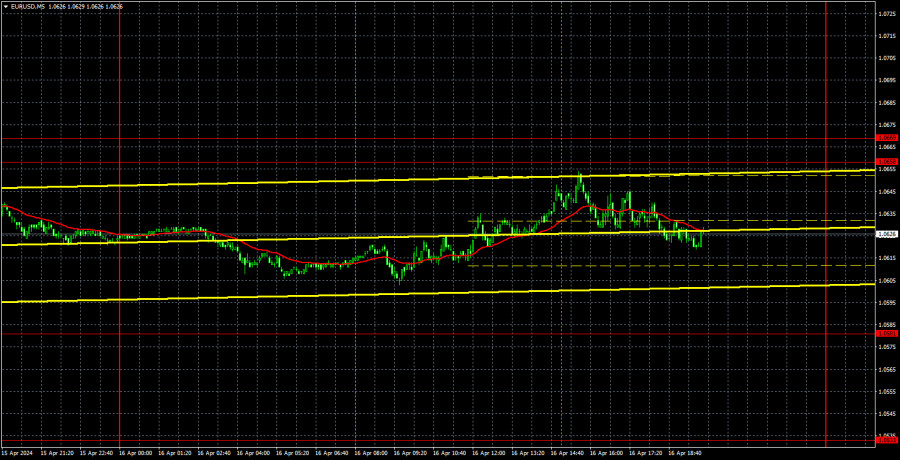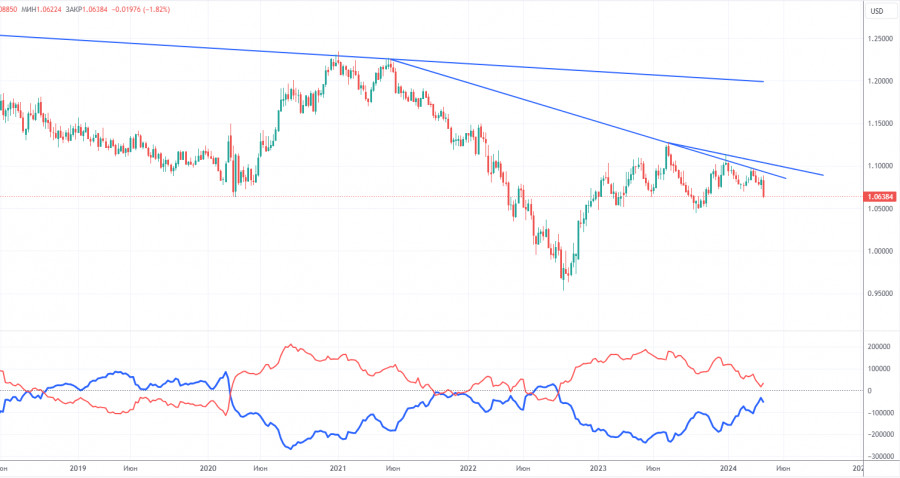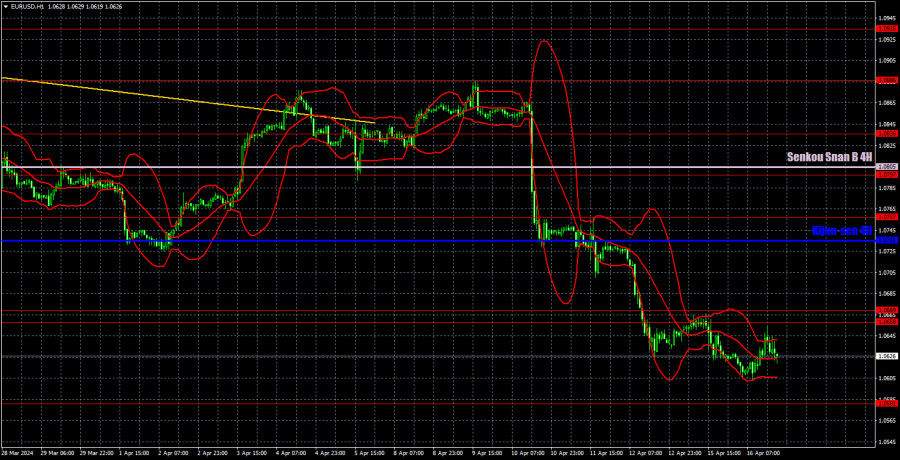Analysis of EUR/USD 5M
EUR/USD did not show any interesting movements on Tuesday. Volatility was quite low. The pair made an attempt to extend the downward movement, tried to start a bullish correction, but eventually realized that neither would work. Thus, the euro continues to stay below the important area of 1.0658-1.0669, so it still has a good chance of continuing the downward movement.
Both the EU and the US released economic reports on Tuesday. In the European Union, the economic sentiment indices for Germany and the EU were published, which we considered as secondary data. Although both reports exceeded forecasts, the market did not react to them. In the United States, data on housing starts and building permits were published. Both turned out to be weaker than expected, which weighed on the dollar in the second half of the day. The industrial production report fully matched traders' expectations and had no impact on the pair's movement. At the end of the day, the technical picture remained unchanged.
No trading signals were formed on Tuesday. Due to weak volatility, the price failed to reach any of the nearest levels, and the Ichimoku indicator lines, after last week's collapse, are very far from the current price. Therefore, traders had no reason to enter the market. Some traders may have stayed in short positions after breaking through the 1.0658-1.0669 area. In this case, these trades can still be kept open.
COT report:
The latest COT report is dated April 9th. The net position of non-commercial traders has been bullish for quite some time. Basically, the number of long positions in the market is higher than the number of short positions. However, at the same time, the net position of non-commercial traders (red line) has been decreasing in recent months, while that of commercial traders (blue line) has been increasing. This shows that market sentiment is turning bearish, as speculators continue to sell the euro. Furthermore, we don't see any fundamental factors that can support the euro's strength, while technical analysis also suggests a downtrend. Three descending trend lines on the weekly chart indicate that there's a good chance of continuing the decline.
At present, the red and blue lines are moving towards each other (indicating a trend reversal after a rise). Therefore, we believe that the euro will fall further. During the last reporting week, the number of long positions for the non-commercial group decreased by 12,800, while the number of short positions decreased by 28,700. Accordingly, the net position increased by 15,900. Overall, both the euro and the net position continue to decline. The number of buy contracts is higher than the number of sell contracts among non-commercial traders by only 32,700 (previously 31,000).
Analysis of EUR/USD 1H
On the 1-hour chart, EUR/USD resumed its downward trend. Since expectations for Fed rate cuts in 2024 have significantly been reduced, the US dollar can and should continue to rise for a couple more months at least. Especially as the ECB is expected to ease its monetary policy as early as June. Practically all the factors suggest downward movement for the pair.
On April 17, we highlight the following levels for trading: 1.0530, 1.0581, 1.0658-1.0669, 1.0757, 1.0797, 1.0836, 1.0886, 1.0935, 1.1006, 1.1092, as well as the Senkou Span B line (1.0805) and the Kijun-sen line (1.0735). The Ichimoku indicator lines can move during the day, so this should be taken into account when identifying trading signals. Don't forget to set a Stop Loss to breakeven if the price has moved in the intended direction by 15 pips. This will protect you against potential losses if the signal turns out to be false.
The final value of the euro area Consumer Price Index for March is due on Wednesday. We believe that the final estimate will not differ from the preliminary one, so the market will not react to this report. The US economic calendar is basically empty. It seems that we are in for a third consecutive "boring day."
Description of the chart:
Support and resistance levels are thick red lines near which the trend may end. They do not provide trading signals;
The Kijun-sen and Senkou Span B lines are the lines of the Ichimoku indicator, plotted to the 1H timeframe from the 4H one. They provide trading signals;
Extreme levels are thin red lines from which the price bounced earlier. They provide trading signals;
Yellow lines are trend lines, trend channels, and any other technical patterns;
Indicator 1 on the COT charts is the net position size for each category of traders;














